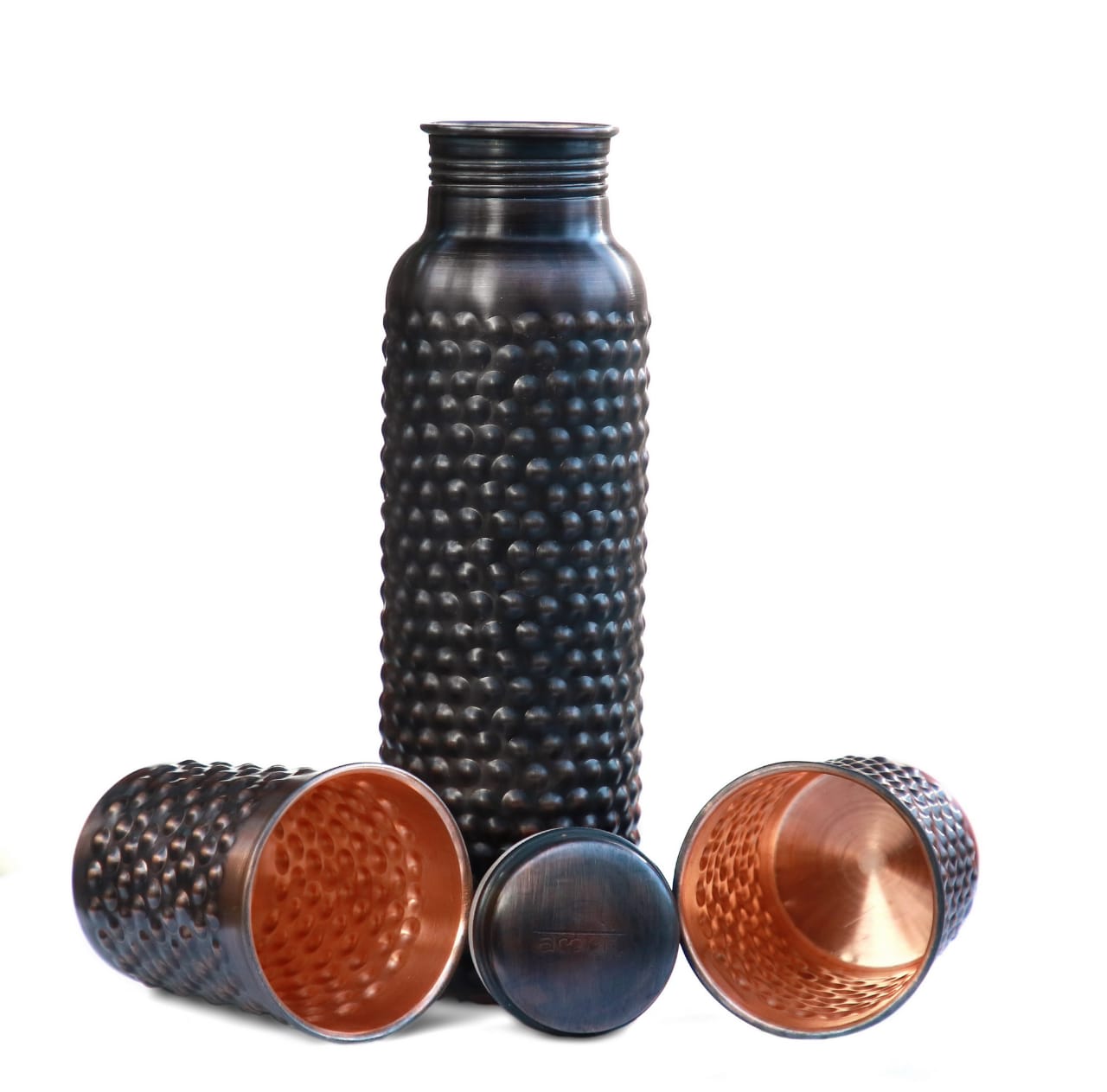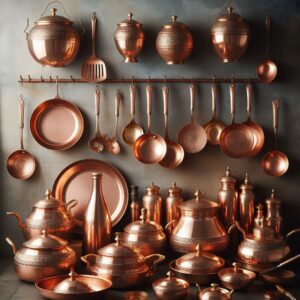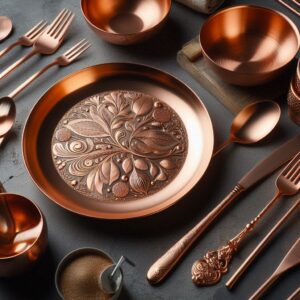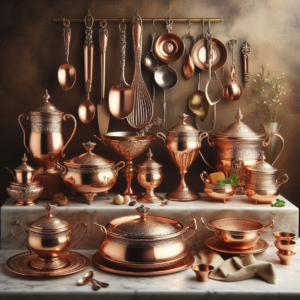Introduction
Copper water bottles have gained popularity for their health benefits and aesthetic appeal. The Pure Copper Matka Bedside Pot Giftset is a perfect blend of tradition and modernity. This gift set not only enhances the beauty of your bedside but also offers numerous health benefits.
Benefits of Copper Bottles
Copper water bottles are known for their antimicrobial properties. Drinking water stored in a copper bottle can help kill harmful bacteria and improve digestion. Copper also aids in weight loss, slows down aging, and boosts brain health. The Pure Copper Matka Bedside Pot Giftset ensures you get these benefits in a stylish and convenient way.
Why Choose the Pure Copper Matka Bedside Pot Giftset?
This gift set is crafted from pure copper, ensuring durability and effectiveness. The traditional matka design adds a touch of elegance to your bedside. It’s a thoughtful gift for loved ones who value health and wellness. The set includes a copper matka and a matching glass, making it a complete package for your hydration needs.
Copper’s Ancient Legacy: Copper Water Bottles has been used for thousands of years, and its antibacterial properties are well-documented. Ancient civilizations recognized copper’s ability to purify water and maintain its freshness.
The Modern-Day Comeback: Today, many people use copper water bottles for storing water, believing it can improve their health. The practice is supported by Ayurveda, an Indian system of holistic medicine.
Safety and Benefits: Storing water in a copper container allows trace amounts of copper to leach into the water. This can have several benefits, including antibacterial effects, which may be particularly useful in areas without access to safe drinking water. However, it’s important to note that while copper deficiency is rare, excess copper can be harmful. Therefore, moderation is key, and it’s generally advised not to store water in a copper vessel for more than six to eight hours.
Potential Downsides: Some individuals may experience adverse effects, such as stomach aches, if they are sensitive to copper or if the water contains excessive copper ions. It’s also advisable to ensure that the copper bottle is pure and not lined with other materials that could contaminate the water.
Copper and Water – A Match Made in the Kitchen
Copper’s relationship with water, especially in the kitchen, is indeed a match with benefits that have been recognized for centuries.
Here’s how copper can elevate your hydration game:
Copper’s Oligodynamic Effect: Copper possesses a natural ability to kill a variety of harmful microbes. This is known as the oligodynamic effect, which refers to the lethal impact small amounts of metals like copper can have on bacteria, viruses, and other microorganisms. This effect makes copper an excellent material for water containers, as it can help purify the water and keep it free from bacteria.
Nature’s Own Purifier: The oligodynamic effect of copper can turn a simple copper vessel into nature’s own purifier. Studies have shown that water stored in copper containers can significantly reduce the presence of harmful bacteria, including E.coli and salmonella. This is particularly beneficial in areas where access to clean water is a challenge.
Elevating Hydration: Using copper vessels for water storage isn’t just about safety; it’s also about health. Copper is an essential trace element required for the proper functioning of the body. Drinking water from a copper vessel allows small amounts of copper ions to leach into the water, providing a natural way to supplement this mineral. This can contribute to improved immune function, better digestion, and potentially other health benefits.
The Health Cocktail Served in a Copper Vessel
Copper is indeed a versatile element with a variety of health-related applications.
Here’s a summary of the benefits you’ve mentioned, supported by research:
Antibacterial Haven: Copper has been recognized for its antimicrobial properties, which include the ability to fight bacteria, viruses, and fungi.
Immunity’s Sidekick: It plays a role in the development of immune cells and has antimicrobial properties that support the immune system.
Digestive Peacekeeper: Copper can aid digestion, kill harmful bacteria in the water, and reduce inflammation in the stomach.
Skin’s Secret Glow: Copper peptides are known to promote collagen production, which can improve skin elasticity and reduce the appearance of wrinkles.
The Fountain of Youth: Copper’s role in the production of collagen and elastin may contribute to its anti-aging effects.
Vital Organ Cheerleader: Adequate copper levels are important for cardiovascular and brain health, affecting functions like neuron signaling and heart rate regulation.
Thyroid’s Balancing Act: Copper stimulates the thyroid and helps balance the gland’s activity, which is crucial for overall metabolic function.
Joint Relief Warrior: While copper is believed to have anti-inflammatory properties, scientific evidence on its effectiveness in reducing arthritis and inflammation is not conclusive.
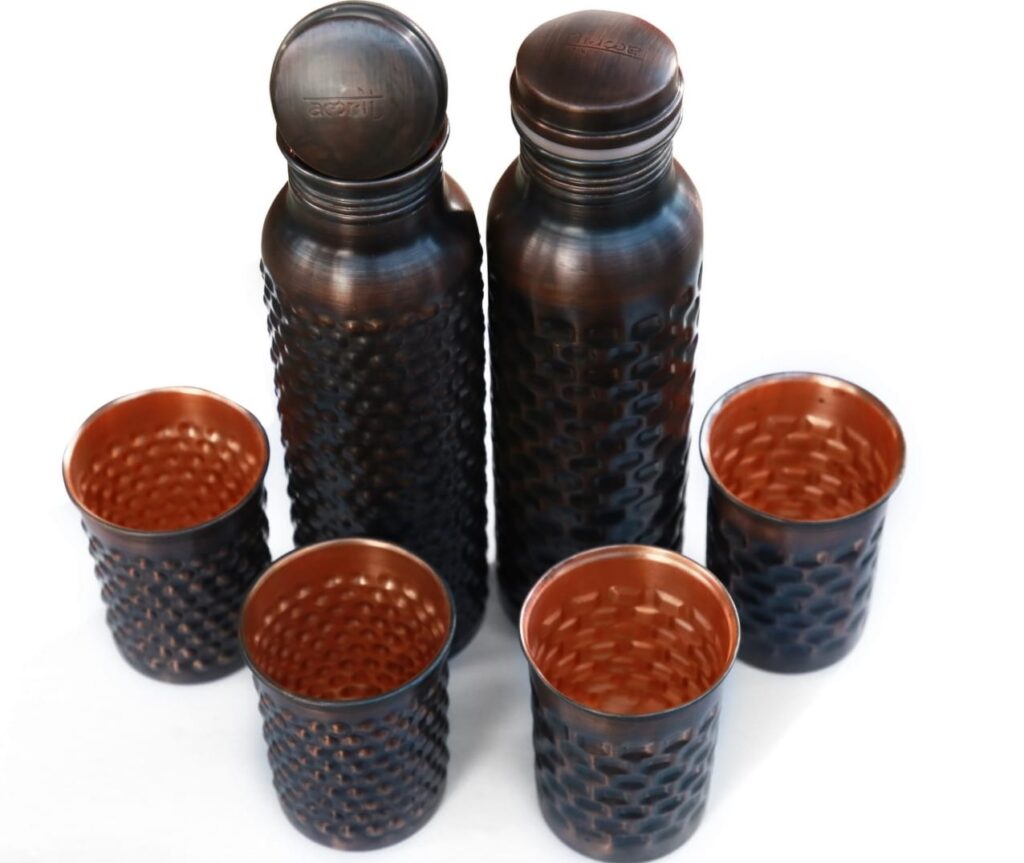
Copper Water Bottles Etiquette – The Do’s and Don’ts
Caring for your copper bottle is essential to ensure its longevity and the quality of the water you drink. Here are some tips for maintaining your copper bottle:
Proper Copper Care:
- Clean Regularly: Use a solution of lemon juice and salt or baking soda and vinegar to clean the inside of the bottle.
- Rinse Thoroughly: After cleaning, rinse the copper water bottle well with water to remove any residue.
- Dry Completely: Pat dry with a soft cloth to prevent water spots and avoid corrosion.
- Avoid Harsh Chemicals: Stick to natural cleaners to maintain the bottle’s integrity.
- Regular Polishing: Keep the exterior shiny by polishing with a natural acid like lemon or vinegar if desired.
Timing is Everything:
- Optimal Duration: It’s recommended to store water in a copper water bottle for about 6 to 8 hours to allow the copper ions to leach into the water and exert their antibacterial properties.
- Freshness: Change the water every day and clean the bottle regularly to ensure the water remains safe to drink.
Too Much of a Good Thing? The Copper Conundrum
While copper is an essential trace mineral beneficial for health, it’s important to be aware of the risks associated with excessive copper intake. Here’s a comprehensive look at the concerns you’ve raised:
Copper Overload: Excessive copper in the body can lead to copper toxicity, which may cause symptoms like headaches, fever, vomiting, diarrhea, jaundice, and even more severe conditions such as liver and kidney damage, heart failure, and brain damage.
Signs to Watch For: Symptoms of copper excess can include:
- Gastrointestinal issues like nausea, vomiting, and diarrhea
- Neurological symptoms such as mood swings, depression, and difficulty focusing
- Physical signs like yellowing of the skin and eyes (jaundice), abdominal cramps, and brown ring-shaped markings in the eyes (Kayser-Fleischer rings).
Not Everyone’s Cup of Tea: Certain individuals should avoid using copper bottles, including:
- Those with Wilson’s disease, a genetic disorder causing copper accumulation
- People with liver or kidney diseases, as their ability to remove excess copper is compromised
- Individuals who are allergic to copper, as they may experience skin rashes or irritation.
It’s crucial to use copper vessels responsibly and consult a healthcare professional if you have any concerns about copper intake. Remember, moderation is key to reaping the benefits without risking copper toxicity.
Conclusion
The debate around copper water bottles is a blend of historical practices and modern health considerations. Here’s a concise wrap-up to help you make an informed decision:
To Copper:
- Historical Legacy: Copper has been used for centuries due to its antibacterial properties.
- Health Benefits: It can offer immune support, aid digestion, and potentially improve skin health.
- Moderation is Key: Using a copper bottle correctly can provide trace amounts of copper, beneficial for health.
Not to Copper:
- Risk of Overload: Excessive copper can lead to toxicity with symptoms like nausea and mood swings.
- Not for Everyone: People with certain health conditions or sensitivities should avoid copper bottles.
- Proper Care: Requires regular cleaning and shouldn’t be used to store water for extended periods.
Ultimately, whether to use a copper bottle comes down to personal choice, health status, and lifestyle. If you’re considering using one, it’s wise to consult with a healthcare provider, especially if you have any underlying health conditions or concerns. Remember, balance and moderation are essential in all aspects of health and wellness. Get the Best Copper Water Bottles from our website The amit life today.

